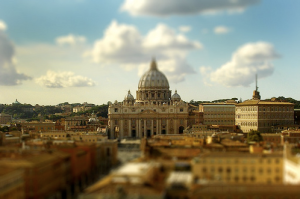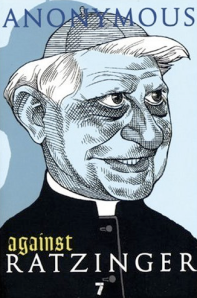Holocaust-denier gives Pope Benedict opportunity
What do you do with a priest who says the Holocaust never happened? That 9/11 was an inside job? And…
What do you do with a priest who says the Holocaust never happened? That 9/11 was an inside job? And that Protestants get their orders from the devil?
If you’re the Pope, you welcome him with open arms.

Well, not quite. In the week after Benedict XVI restored an ultra-conservative Catholic sect known as the Lefebvrevists, the Vatican has been desperately trying to make it clear that the Holocaust (or Shoah) was a very real blight on human history.
The reason for these public statements? British-born Richard Williamson, a nutty 68 year-old priest ordained as a bishop under the Lefebvrevist movement, openly opined on Swedish TV that the Nazi gas chambers did not really exist. Yikes!
As the public relations nightmare continues, the Pope should take the Williamson gaffe as an opportunity to soften his image.
Show the world that being Pope does not mean you can’t openly and unequivocally apologize. Paint a giant mea culpa (Latin for “my bad”) across the sky. Better yet, mea maxima culpa (Latin for “no really, my bad”). People would be relieved and the problem would go away a lot sooner. Call it for what it is: a well-intended but poorly-researched decision.
What does Benedict have to lose? 
What about papal infallibility, the Roman Catholic belief that whatever the Pope says goes? Not a problem. In 1996, long before Joseph Ratzinger became Pope, Benedict told an interviewer that the doctrine is not well understood:
“As a matter of fact, this dogma does not mean that everything the Pope says is infallible. It simply means… there is a final decision-making authority.”
Ratzinger/Benedict has long had a public image problem, and has been criticized as an ultra-conservative himself. A lot of this is unavoidable: the teachings of Catholicism are at odds with much of the public opinion in the western world, as is the idea of an octagenarian religious leader pronouncing on contemporary social issues. But as I said in my last blog post, religious leaders can’t be simply reduced to politicians without remainder.
But a strong direct statement could have a healing effect, much like Pope John Paul II’s tearful apology for the sufferings of the Jewish people.
A bonus for directly calling the Williamson fiasco a mistake?
It means Holocaust-denial doesn’t get any more time in the spotlight.
